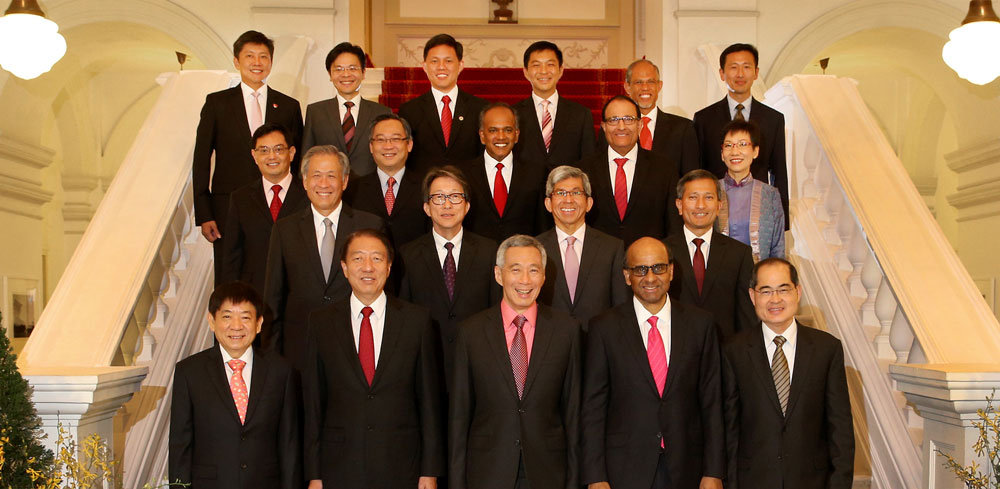Politics is serious business.
But it's perhaps inevitable that people on the outside, especially those who are curious about political competition and leadership succession, treat it like a spectator sport.
As they are often not privy to the thinking that goes on behind the scenes, all they can decipher from the outside looking in is what they can see and read.
Abrupt ministerial change: The Tan Chuan-Jin episode
Talking about ministerial changes, the abrupt departure of Tan Chuan-Jin from the Cabinet in September 2017 is still fresh in many people's minds.
The intense public speculation prompted him to publicly clarify what he had said on social media .
[related_story]
How PM Lee appraises the performance of ministers
It's still a couple of months away before a widely-expected Cabinet reshuffle.
When it happens, it is not hard to foresee that the public reaction will mostly be about who's up, who's in or who's out, when the news comes out.
While the core of the 4G leadership is taking shape, it's actually a good time to learn more about how Prime Minister Lee Hsien Loong appraises ministers and his views on the Cabinet's collective responsibility.
Something that is worth re-reading (in full if you have the time) is PM Lee's Parliament speech on the topic of Ministerial Salaries in January 2012.
Although he was addressing the issue of ministerial pay and bonuses, he also spoke about the considerations behind the assessment of a minister's performance.
1. A good minister is pro-active and entrepreneurial
"A good minister does not just do and fulfill what the PM tells him to do. A good and entrepreneurial minister expands the scope of his responsibilities, imagines things which he could do and embarks on projects which nobody asks him to, but which turn out to be good ideas and deliver outstanding results for Singapore."
2. Not every minister is equal and they know it
"Not every minister is equal. Ministers know it, the public knows it. And we have our own relative assessments, the public has their own relative assessments and sometimes the public is not shy to tell us what they think. They may or may not be right, but different ministers have different contributions, in terms of their responsibilities, in terms of their abilities, in terms of their judgment and their ability to work in a crisis. Therefore, ministers need to be at different grades and be paid different performance bonuses. But they are all part of one team, and each one has a contribution to make so that the team as a whole functions well."
3. Ministers answer for mistakes but it should be kept in perspective
"So Singaporeans have to evaluate ministers fairly, and they have to take into account both the contributions and the shortcomings. And you have to look at it objectively and holistically because quite often, contributions may be silent but when something goes wrong, it goes wrong with a bang. And we must try and keep that in perspective."
"If ministers make mistakes, then of course, they must take responsibility and put things right. We cannot expect ministers never to make mistakes or never to have mistakes happen on their watch in their ministries. It is not possible -- this is a very big organisation and it is a very complicated world, and even with the best intent in the world, from time to time, things will go wrong. And when things go wrong, you have to put them right. And if it is your responsibility, you have done it wrong, then you apologise and you answer for it."
4. Not all ministers will succeed
"But if a Minister does not perform well despite all his best efforts, then I may move him to a less demanding portfolio where he is able to perform, or if necessary, I may have to phase him out discreetly. It is not always visible, but it is necessary to do and it is necessary to understand why not everything can be done in the full glare of the spotlights."
"It is a difficult job, you never know until you are in it whether it will work or it will not work, and sometimes you have to give it a try. I can make two types of mistakes: I can put in somebody and it did not work, or I may decide I do not want to try somebody and he could have been a good minister. So I think that I have to accept that when people come in to be ministers, sometimes it does not work out, in which case I need a graceful way to disengage and part amicably."
5. Exits have to be handled with dignity and decorum
"Exits are delicate matters, and they have to be handled with dignity and decorum. Ministers too, are deserving of dignity and decorum. You cannot turn this into a public spectacle and have it deter more good people from entering politics. So, this is how all organisations handle personnel changes, and we have to do this with ministers too, and I hope Singaporeans understand this."
6. The accountability is not individual ministers but the Cabinet
"All ministers are collectively responsible for Cabinet’s decisions, whether it is building houses, whether it is building train lines, whether it is setting taxes, whether it is setting immigration policies. There is a doctrine, it is a collective responsibility; all ministers are party to this. And all ministers are held to account ultimately when we go to the next General Elections and the public is the final judge of the government's record."
Related articles:
Top photo from PMO website.
If you like what you read, follow us on Facebook, Instagram, Twitter and Telegram to get the latest updates.
